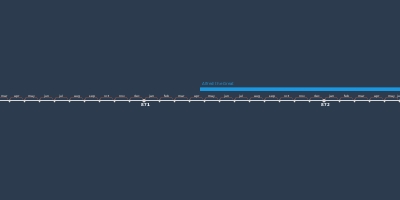Interregnum (dec 31, 1250 – nov 25, 1308)
Description:
After the deposition of Frederick II by Pope Innocent IV in 1245, Henry Raspe, Landgrave of Thuringia was set up as anti-king to Frederick's son Conrad IV (d. 1254). Henry was killed in 1247 and succeeded as anti-king by William of Holland (died 1256). After 1257, the crown was contested between Richard of Cornwall (Henry III of England's younger brother), who was supported by the Welf party, and Alfonso X of Castile, who was recognized by the Hohenstaufen party but never set foot on German soil. After Richard's death in 1273, Rudolf I of Germany, a minor pro-Staufen count, was elected. He was the first of the Habsburgs to hold a royal title, but he was never crowned emperor. After Rudolf's death in 1291, Adolf and Rudolf's son Albert were two further weak kings who were never crowned emperor.Albert was assassinated in 1308. Almost immediately, King Philippe IV of France began aggressively seeking support for his brother, Charles of Valois, to be elected the next King of the Romans. Philippe thought he had the backing of the French Pope Clement V (established at Avignon in 1309), and that his prospects of bringing the empire into the orbit of the French royal house were good. He lavishly spread French money in the hope of bribing the German electors. Although Charles of Valois had the backing of Henry, Archbishop of Cologne, a French supporter, many were not keen to see an expansion of French power, least of all Clement V. The principal rival to Charles appeared to be Rudolf I "the Stammerer," Duke of Bavaria and grandson of Habsburg Rudolf I (Rudolf's daughter Matilda of Habsburg was his mother, and future Emperor Louis IV the Bavarian his younger brother).
Instead, Henry VII, of the House of Luxembourg, was elected with six votes at Frankfurt on 27 November 1308. Given his background, although he was a vassal of king Philippe, Henry was bound by few national ties, an aspect of his suitability as a compromise candidate among the electors, the great territorial magnates who had lived without a crowned emperor for decades, and who were unhappy with both Charles and Rudolf. Henry of Cologne's brother, Baldwin, Archbishop of Trier, won over a number of the electors, including Henry, in exchange for some substantial concessions. Henry VII was crowned king at Aachen on 6 January 1309, and emperor by Pope Clement V on 29 June 1312 in Rome, ending the interregnum.
Added to timeline:
Date:
dec 31, 1250
nov 25, 1308
~ 57 years
